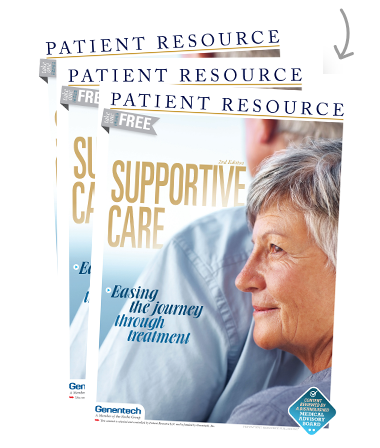Decreased Appetite
Regain your appetite during treatment
The loss of appetite, or the lack of desire to eat because of how you feel overall, is known as anorexia, which is different from the eating disorder known as anorexia nervosa. Loss of appetite is one of the most challenging symptoms for cancer patients and their families.
What causes decreased appetite?
Anorexia is usually caused by the side effects of cancer treatment, including nausea and vomiting, mouth sores, pain, fatigue, diarrhea, constipation and/or taste changes. These symptoms affect your overall well-being and desire to eat.
In addition, surgery, especially surgery of the digestive system or the head and neck area, can cause anorexia, as can radiation therapy and chemotherapy.
Who is at risk for decreased appetite?
Anyone whose cancer treatment affects their digestive system or causes severe side effects is at risk for anorexia. Those receiving the cancer treatment drugs cisplatin, cyclophosphamide, doxorubicin (Doxil), fluorouracil, paclitaxel (Abraxane) or vincristine are most likely to experience taste changes (such as a bitter or metallic taste) that can affect the desire to eat and lead to anorexia. In addition, people whose cancer is advanced have an increased risk for anorexia.
When does decreased appetite occur?
The timing of anorexia varies widely. The loss of appetite may occur mostly on treatment days or may persist throughout treatment. Appetite usually returns to normal one to two weeks after treatment has ended, but sometimes the loss of appetite may persist long after the end of treatment.
How is decreased appetite managed?
The focus of managing anorexia is to treat the symptoms causing it. For example, controlling nausea and vomiting can improve appetite; treating mouth sores can make it more comfortable to eat; and taking pain medication 30 to 60 minutes before a meal may improve your desire to eat. In addition, modifying your eating habits can help you ensure adequate nutrition and avoid weight loss (Table 1).
| Table 1. Eating habits to improve appetite and maintain nutrition | |
|
Eat high-calorie, soft foods
|
-
Examples: casseroles, stews, macaroni and cheese, creamy soups, eggs,
pancakes, waffles, French toast, mashed potatoes, pasta dishes, pudding and ice cream |
|
Drink high-calorie beverages
|
-
Examples: juices, milk, malted milk, cocoa, shakes, smoothies, breakfast drinks
and nutritional supplement beverages (e.g., Ensure, Boost) |
|
Keep high-calorie snacks readily available
|
- Have them nearby at home and take them with you when you run errands.
-
Examples: peanut butter, cheese, ice cream, pudding, nuts, trail mix, breakfast
bars, cereal, yogurt, cottage cheese and hard-boiled eggs |
|
Opt for more frequent smaller meals
|
- Eat five to six small meals throughout the day rather than three large meals
|
|
Eat when you have the most hunger
|
- Schedule your “main” meal of the day for when your appetite is best and you are
able to eat the most |
|
Plan your meals and vary your foods to enhance taste
|
- Plan meals that include your favorite foods
- Increase the use of seasonings, and vary the odors and textures of foods
- Use acidic foods (such as lemon wedges, pickles and olives) to stimulate your
taste buds |
|
Make mealtime pleasant
|
- Create a pleasant setting for mealtimes and make them relaxed and unhurried
- Have meals with family and friends
- Go to a restaurant for a change of pace
|
|
Eat high-calorie, nutritious foods first at mealtimes
|
- Start with the protein (meat, eggs, beans, etc.), follow with the starches (potatoes,
pasta, etc.) and end with vegetables
- Limit your fluid intake during meals to mere sips to prevent beverages from
making you feel full |
Several cookbooks are available for people with cancer (see Cookbooks for people with cancer below). Your doctor may also suggest that you see a dietitian or nutritionist to help you select foods that provide good nutrition and are easy to eat.
Physical activity can help stimulate your appetite, and drugs that enhance appetite, such as megestrol acetate (Megace) and corticosteroids (dexamethasone), are also available. These drugs have side effects, however, so your doctor will help you decide whether an appetite enhancer is appropriate for you.
When should I talk to my doctor about decreased appetite?
Talk to your doctor about changes in your appetite and other symptoms you have that may make it difficult to eat. Also tell your doctor if you’ve lost five or more pounds since the beginning of treatment.
Cookbooks for people with cancer
- Betty Crocker’s Living with Cancer Cookbook. Kris Ghosh and Linda Carson. Betty Crocker, 2011.
- Eating Well Through Cancer: Easy Recipes & Recommendations During and After Treatment. Holly Clegg and Gerald Miletello. Favorite Recipe Press, 2006.
- One Bite at a Time: Nourishing Recipes for Cancer Survivors and Their Friends, 2nd Edition. Rebecca Katz and Mat Edelson. Celestial Press, 2008.
- What to Eat During Cancer Treatment: 100 Great-Tasting, Family-Friendly Recipes to Help You Cope. Jeanne Besser, Sheri Knecht, Kristina Ratley and Michele Szafranski. American Cancer Society Inc., 2009.



